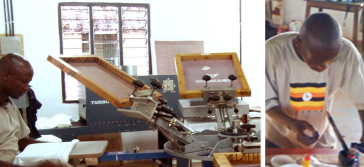 |
STEP ONE:
This collection's 100% organic cotton is sourced from Chetna
Organic Agriculture Producer Company Ltd., a certified organic and fair trade
farmer-owned cooperative representing nearly 5,500 smallholder
cotton farmers from the Indian states of Andhra Pradesh,
Maharashtra and Orissa. Chetna cotton is cultivated without the
use of child labor, synthetic pesticides, fertilizers or GMOs.
|
 |
STEP TWO:
Chetna Organics has a socially responsible integrated supply chain
right from farm to fabric. Each and every stage of processing
conforms to internationally accepted standards of Organic and Fair
Trade. The ginning stage happens after the cotton is harvested
and cleaned. The gin machines separate the cotton fibers from the
seeds for further cleaning, and baling for transport.
|
 |
STEP THREE:
The clean, baled organic cotton is then sent to Rajlakshmi Cotton
Mills, a certified organic textiles producer based in Kolkata, India,
where the cotton goes through three more steps; spinning, knitting
and dyeing before it makes it to Wildlife Works' Eco Factory. In
the first step, the organic cotton is taken to their spinning
department where the fibers are spun into yarn.
|
 |
STEP FOUR:
Next, the yarn is knitted into fabric. Rajlakshmi Cotton Mills'
industrial knitting machines can produce high quality organic cotton
and cotton blend fabrics. Wildlife Works uses 110gsm cotton jersey
for the womens' and girls' styles and 180gsm cotton jersey for the
mens' and boys' styles.
|
 |
STEP FIVE:
The fabric is then dyed to Wildlife Works' chosen colors. Rajlakshmi
Cotton Mills' dyeing factories are certified under Control Union and
Ecocert, to be consistent with the organic certification standards.
Their dye machines have effluent treatment plants, which can
produce steam and bio-mass from the waste products.
|
 |
STEP SIX:
Wildlife Works employs 66 full-time factory workers at the Eco
Factory located in Rukinga, Kenya. They are paid according to the
Government of Kenya's fair wage guidelines for city-level skilled
wages with full health care coverage for themselves and their
families. Trained by Wildlife Works, many of the seamstresses have
been with the company since the factory opened its doors in 2000.
|
 |
STEP SEVEN:
Wildlife Works does all screen printing by hand and in-house at the
Rukinga Sanctuary. From building the wood screens to hand mixing eco friendly
dyes, the screen printing process defines handmade.
All 7 activities including the shipping of the fabric, finished products
from the factory to our facility in the U.S. and then finally to you is
offset by retiring credits from the protection of our forests.
|
 |
Our factory has these certifications.
Wildlife Friendly
Fair Trade USA
Fair Trade International
|









